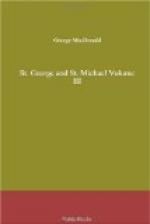’What became of the wild beasts in the base of the kitchen-tower, dost know, Richard?’
‘I saw their cages,’ answered Richard, ’but they were empty. I asked what they were, and what had become of the animals, of which all the country had heard, but no one could tell me. I asked them questions until they began to puzzle themselves to answer them, and now I believe all Gwent is divided between two opinions as to their fate—one, that they are roaming the country, the other that lord Herbert, as they still call him, has by his magic conveyed them away to Ireland to assist him in a general massacre of the Protestants.’
Mighty in mutual faith, neither politics, nor morals, nor even theology was any more able to part those whose plain truth had begotten absolute confidence. Strive they might, sin they could not, against each other. They talked, wandering about, a long time, forgetting, I am sorry to say, even their poor shivering horses, which, after trying to console themselves with the renewal of a friendship which a broad white line across Lady’s face had for a moment, on Dick’s part, somewhat impeded, had become very restless. At length an expostulatory whinny from Lady called Richard to his duty, and with compunctions of heart the pair hurried to mount. They rode home together in a bliss that would have been too deep almost for conscious delight but that their animals were eager after motion, and as now the surface of the fields had grown soft, they turned into them, and a tremendous gallop soon brought their gladness to the surface in great fountain throbs of joy.
CHAPTER LIX.
Ave! Vale! Salve!
And now must I bury my dead out of my sight—bid farewell to the old resplendent, stately, scarred, defiant Raglan, itself the grave of many an old story, and the cradle of the new, and alas! in contrast with the old, not merely the mechanical, but the unpoetic and commonplace, yes vulgar era of our island’s history. Little did lord Herbert dream of the age he was initiating—of the irreverence and pride and destruction that were about to follow in his footsteps, wasting, defiling, scarring, obliterating, turning beauty into ashes, and worse! That divine mechanics should thus, through selfishness and avarice, be leagued with filth and squalor and ugliness! When one looks upon Raglan, indignation rises—not at the storm of iron which battered its walls to powder, hardly even at the decree to level them with the dust, but at the later destroyer who could desecrate the beauty yet left by wrath and fear, who with the stones of my lady’s chamber would build a kennel, or with the carved stones of chapel or hall a barn or cowhouse! What would the inventor of the water-commanding engine have said to the pollution of our waters, the destruction of the very landmarks of our history, the desecration of ruins that ought to be venerated for




